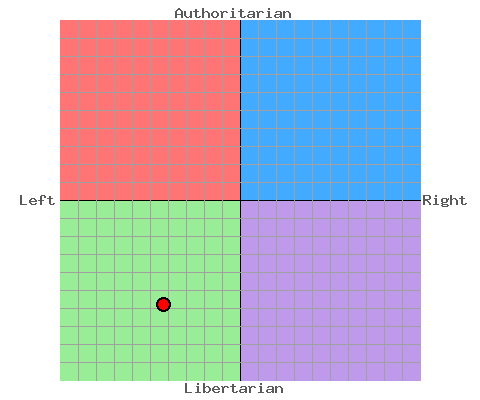Eske Esquire wrote:
I think you're overlooking a key fact: that someone can not have a strong opinion on particular topics. It's entirely possible for the only positions that a person holds are liberal and libertarian ones. For example, I'm not really interested in the economy beyond "I'd like it to do well." I don't really have any other opinions on it.
Also, some convictions are held more strongly than others. I think that stronger held opinions should be weighted higher when consider what category a person falls into.
Also, some convictions are held more strongly than others. I think that stronger held opinions should be weighted higher when consider what category a person falls into.
Sure. But that only changes the degree to which you'd presumably fall in one direction or another on some political axis, right? My point is that regardless of how strongly you feel about something, the correct way to measure someone's position on an axis called "social" in which "authoritarian" is at one end and "libertarian" is at the other is to measure the degree to which rules and regulations are in place to enforce specific social results. If you support *any* laws designed to affect social outcomes, you should fall more towards the "authoritarian" side, while opposition to said laws puts you towards the "libertarian" side.
Can anyone honestly argue that the Democratic party is *not* heavily about creating laws designed to impose specific social outcomes? Ignore the side issue about the degree to which economics plays a role and just ask "Do Democrats work hard to pass laws to change social outcomes"? I think the answer is a very clear and very strong: Yes!
I just don't see how anyone can disagree with this. Not unless you completely ignore what authoritarian and libertarian mean in this context. And if you are ignoring that, then what's the point of using those labels?
EDIT: Let me be clear about something btw. When I say laws designed to affect social outcomes, this does not include eliminating existing laws which impose actual social inequalities (or to amend them so they no longer contain them). So removing the restriction that only white males could vote is libertarian, not authoritarian. Similarly, removing the restriction that only males could vote is libertarian. Eliminating Jim Crow laws is libertarian. Ending segregation is libertarian. But creating affirmative action laws is authoritarian. Racial quotas are authoritarian.
You need to get past thinking in terms of "do I think this is good for <insert minority group>?" and think in terms of "am I creating a rule or law that imposes a social outcome rather than just allows people to deal with themselves on their own". That axis is not about right or wrong, good or evil. It's about the degree to which we're bound by laws with regard to our social interactions. That's it.
Edited, May 5th 2011 7:45pm by gbaji



